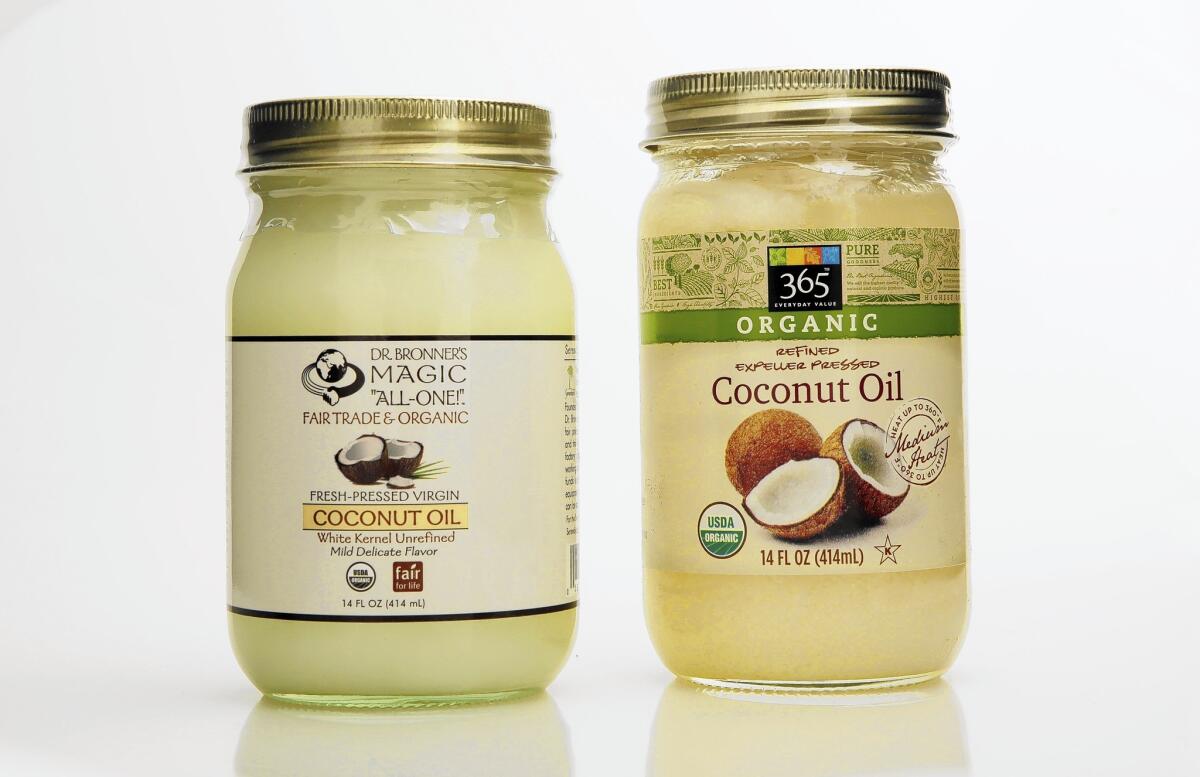Coconut oil has a new image as health, beauty aid

Once vilified for its abundant fat content, coconut oil is being trumpeted as a miracle elixir. As a health fad, it’s dual purpose, bandied about as a head-to-toe natural beauty product and as a food that can cure what ails you.
Coconut oil’s health connection reaches back a few thousand years to a system of natural healing with origins in India. Modern science has documented its effectiveness as a moisturizer, but evidence to support its dietary health benefits is largely anecdotal.
“As a society, we tend to be people who like that quick Band-Aid approach, but there is no magic bullet. The science is still gray,” says Vandana Sheth, a spokeswoman for the Academy of Nutrition and Dietetics. “Coconut oil is just the latest product out there.”
In other words, believer beware.
The popcorn scare
In 1994, the Center for Science in the Public Interest pilloried coconut oil in a study that concluded that a large container of popcorn — often popped in partially hydrogenated coconut oil — sold at movie theater concession stands contained the saturated fat of six Big Macs.
But two decades later, coconut oil is a staple of health food stores, a remarkable turnaround that’s related to improvements in processing and “the evolution of the science around it,” says Susan Mitmesser, director of nutrition research for Sundown Naturals, whose nutritional supplements include coconut oil.
“The coconut oil we see today is not the same that we saw in the 1970s and 1980s,” she says. “Earlier coconut oils were highly processed and refined, and that has changed.”
At the market
Grocery stores carry two main types of coconut oil for baking and cooking: virgin and refined.
The virgin oil is extracted from the meat of fresh coconut without the use of high heat or chemicals and retains the distinct coconut aroma and taste. Virgin oil has a higher nutrient content than its refined cousin.
Made from dried coconut meat that’s been chemically bleached and deodorized, refined coconut oil is tasteless. But since it can withstand higher temperatures than the virgin oil, it is useful as a plant-based replacement for butter and stands up well in baking and sautéing, according to the Academy of Nutrition and Dietetics.
The academy recommends reaching for virgin coconut oil — in moderation. “It’s still a fat,” reminds Sheth, a South Bay nutritionist. She advises following American Heart Assn. guidelines that recommend limiting total saturated fat consumption to less than 7% of total daily calories.
The big fats truth
Coconut oil is made up of about 90% saturated fat, but “the scientific community has started to figure out that not all saturated fats are equal,” Mitmesser says.
Research has shown that more than half of the fat molecules in coconut oil are shorter than those in animal-derived saturated fat. These “medium chain” fatty acids appear to increase “good” cholesterol and are easier to metabolize and digest. Still, nearly 40% are “long chain,” the type found in meat products and linked to heart disease.
“Coconut oil should never be an addition; it should be a substitution for other saturated fats,” says Mitmesser.
Studies have shown that overweight participants who restricted calorie intake and included coconut oil in their diets lost more weight and body fat than those who did not. But the substitution of coconut oil for other fats could be behind the results, experts say.
Smoothing moves
If beauty magazines and blogs are to be believed, coconut oil is a bottomless jar of beauty tricks. (Soothe your hands! Condition your scalp! Revitalize your feet!) Many of the tips directly relate to the oil’s demonstrated ability to moisturize skin.
Research has shown coconut oil to “hydrate as well as mineral oil and reduce bacterial skin colonization of dangerous Staph aureus infections,” says Dr. Cynthia Bailey, a dermatologist in Sebastopol, Calif. Many of her patients prefer chemical-free products, and she has found coconut oil to be effective in treating eczema, dermatitis and skin inflammation. “It’s also economical and lasts forever if you keep it in the fridge.”
::
Some sources of information about coconut oil:
Academy of Nutrition and Dietetics, www.eatright.org
National Standard Research Collaboration, www.naturalstandard.com
University of South Florida plan for a trial including coconut oil for Alzheimer’s disease, lat.ms/1hMOUuy




